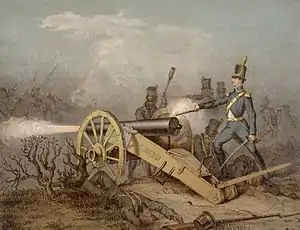Battle of Lappfjärd
The Battle of Lappfjärd was fought between Swedish and Russian forces at Lappfjärd in Finland on 29 August 1808 during the Finnish War.
| Battle of Lappfjärd | |||||||
|---|---|---|---|---|---|---|---|
| Part of the Finnish War | |||||||
| |||||||
| Belligerents | |||||||
|
|
| ||||||
| Commanders and leaders | |||||||
|
|
| ||||||
| Strength | |||||||
|
5,400 15 guns[1] |
2,150 6 guns[1] | ||||||
| Casualties and losses | |||||||
| 113 killed or wounded[1] |
153 killed or wounded 82 captured[1] | ||||||
Background
Upon hearing the news of Koslov's attack at Nummijärvi, Russian General Bibikov (positioned at Ömossa, south of Lappfjärd), likewise decided to attack, with 2,150 men of his own, thinking his numerical superiority could easily overwhelm the Swedish troops at Lappfjärd. Unbeknownst to Bibikov, however, he would march against a Swedish force more than twice the size of his own, under Eberhard von Vegesack, who had landed at Kristinestad with 3,000 men, on 28 August, and taken command over the troops at Lappfjärd.[1]
Swedish forces
- Björneborg Infantry Regiment (2 battalions)
- Hälsinge Infantry Regiment (3 battalions)
- Uppland Infantry Regiment (2 battalions)
- Gyllenbögel Infantry Regiment (2 battalions)
- Närpe and Malak Landwehr (3 companies)
- A small contingent of the Jämtland and Västerbotten Infantry Regiments
- Life Guards of Horse (2 squadrons)
- Svea and Finnish Artillery Regiments (15 guns)
In total: 5,400 men and 15 guns[2]
Battle
The Russian army under General Bibikov counted 2,150 men with six guns, while von Vegesack's total force numbered 5,400 men with 15 guns — although far from all the Swedish troops would be engaged in the forthcoming battle. On 29 August the Russians launched a fruitless attack on the Swedes; attempts were made to force the Swedish flanks to give way, but in vain. After four hours of fighting the Swedish commander ordered a counterattack which forced the Russians to retreat; the battle had played out much like the fighting the day earlier, at Nummijärvi. The Russians retreated with a loss of 153 men killed or wounded while 82 had been captured by the Swedes; who had sustained 113 killed or wounded.[1] The main Swedish army then fought the Battles of Ruona and Salmi, on 1–2 September 1808, which marked a turning point in the war.[3]
Aftermath

At Lappfjärd the Swedish commander, von Vegesack, had greatly overestimated the Russian strength and thus failed to deliver a crushing defeat;[1] a Swedish outpost was soon established at Ömossa which consisted of one battalion from the Uppland Infantry Regiment and two guns from the Svea Artillery Regiment, led by Wilhelm von Schwerin. It was attacked by Bibikov with 1,500 men and six guns, on 6 September. The Swedes were forced back, with a loss of 64 killed or wounded, only after several Russian attacks had been repulsed (among others, by the Cossack Life Guards Regiment); mostly thanks to von Schwerin's stubborn defense at the guns, which allowed the Swedes to retreat in good order.[3]
Citations and sources
Citations
- Hornborg 1955, pp. 141–142.
- Hornborg 1955, p. 141.
- Hornborg 1955, pp. 151–152.
Sources
- Hornborg, Eirik (1955). När riket sprängdes: fälttågen i Finland och Västerbotten, 1808-1809 (in Swedish). Stockholm: P. A. Norstedts och Söners Förlag.